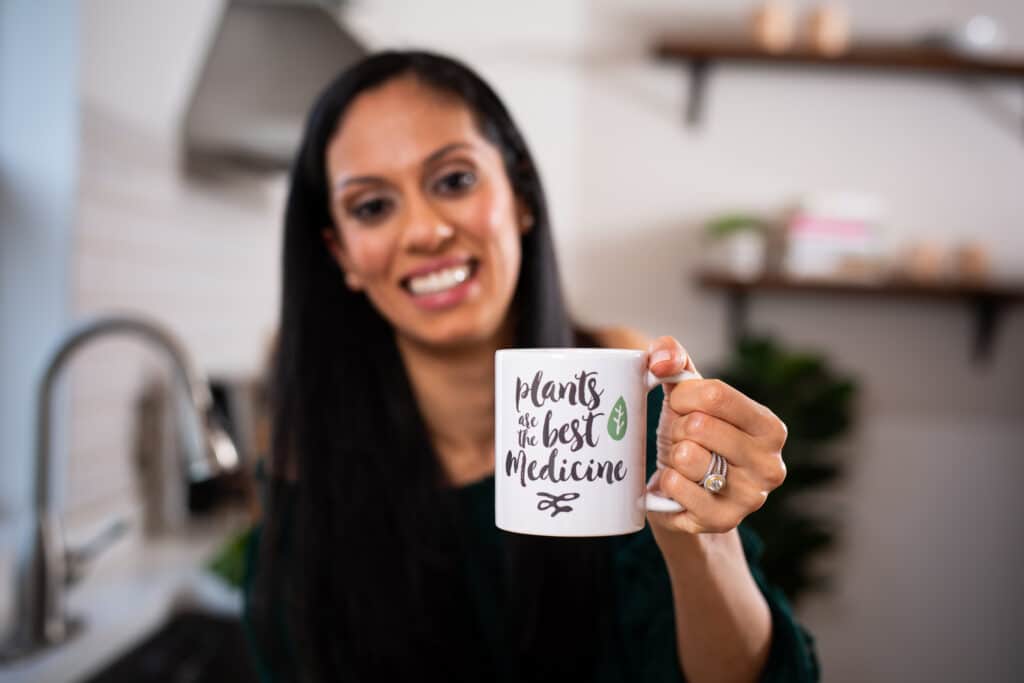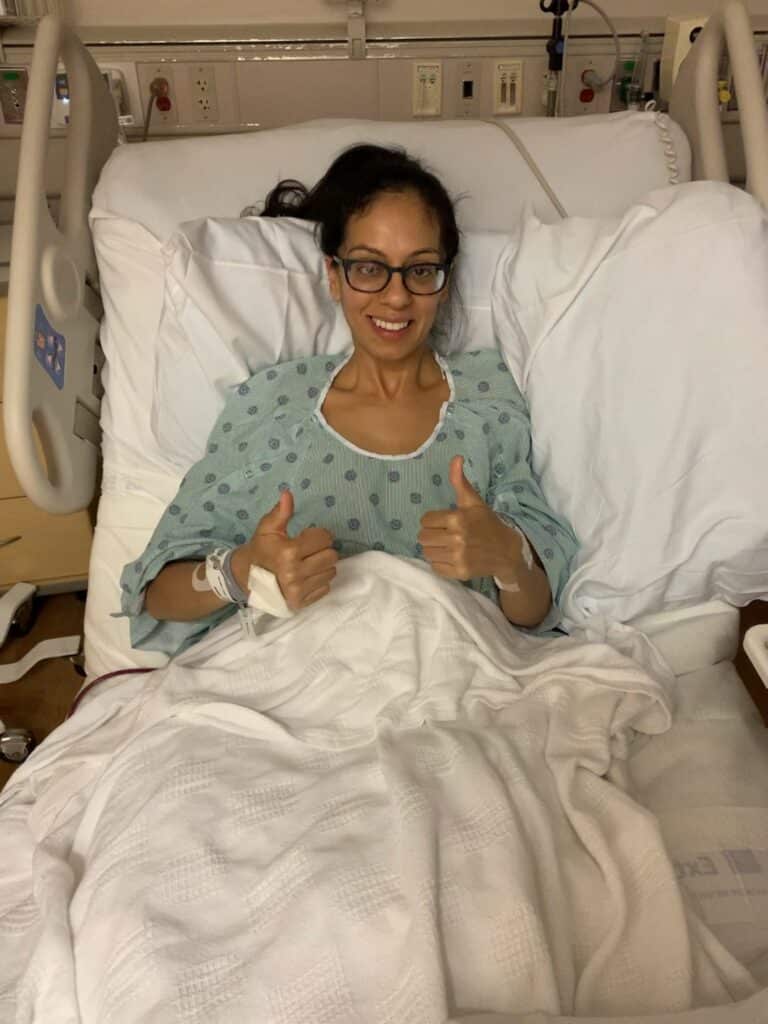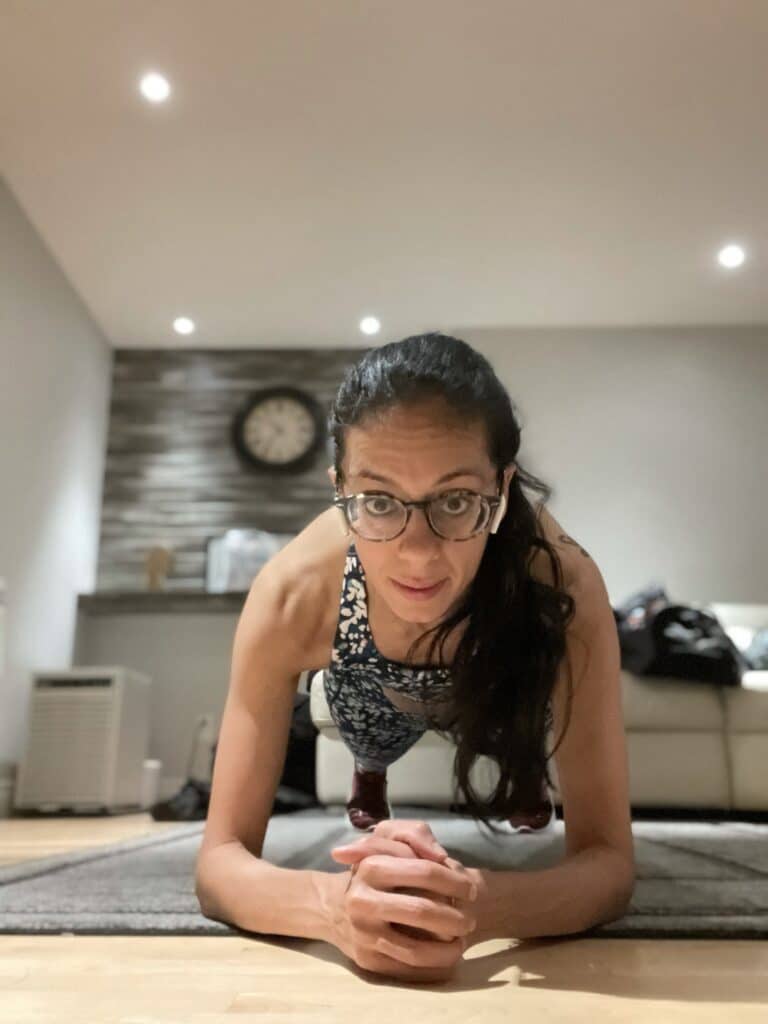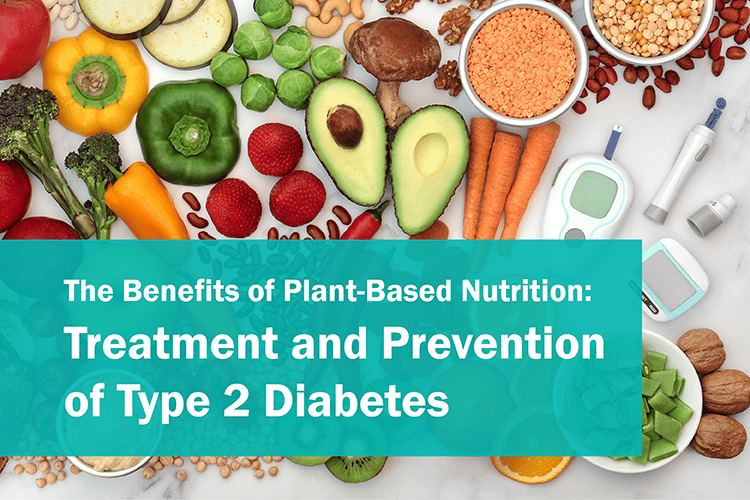A doctor discovered she was genetically predisposed to cancer. Now she inspires others to believe genes don’t equal destiny.
“The everyday things that we all do in our lives — the way we eat, the way we move, the way we think — have so much of a bigger impact on our health and wellbeing than we are often led to believe.”
– Dr. Simran Malhotra

Simran Malhotra was 26, close to finishing her medical residency training and preparing to marry the man of her dreams, a fellow doctor.
Life was good, but one worry lingered.
When Dr. Malhotra was 13, her mother was diagnosed with breast cancer at age 33. Now Dr. Malhotra had grown aware of a troubling number of cancer diagnoses among family members, often at young ages, in her mother’s native India.
An oncology attending physician suggested Dr. Malhotra undergo testing for genetic mutations that would put her at higher risk of cancer occurrence.
“I decided that this would have a major impact on my husband-to-be and that he deserved to know what he would be getting into,” Dr. Malhotra said.
That test in 2014 revealed that Dr. Malhotra carried the BRCA1 gene mutation, just like her mother, that significantly increased her likelihood of developing breast and ovarian cancer. About 12% of U.S, women will develop invasive breast cancer in their lifetimes but women with the BRCA1 mutation have up to an 80% risk of breast cancer and between 40% to 60% increased risk of ovarian cancer.
Dr. Malhotra and her husband, Dr. Frank Gregoire, were grateful to learn about her risk but the information clouded their future with anxiety and hard decisions. The preventive options presented to Dr. Malhotra were prophylactic mastectomy and hysterectomy. However, the Dr. Malhotra and Dr. Gregoire wanted to have children before taking that step.
They accelerated their life plans. The couple had two children 18 months apart while Dr. Malhotra underwent frequent cancer screenings, and biopsies for suspicious lesions. They pursued careers — her husband in pulmonary and critical care medicine and Dr. Malhotra in hospice and palliative care.
During a palliative care fellowship at John Hopkins Hospital, Dr. Malhotra bonded with a patient in her early 40s who carried the BRCA 1 genetic mutation and nearing her final days of life due to ovarian cancer. Before she died, the woman implored Dr. Malhotra to avoid the same fate.
“She said ‘Do whatever you need to do to live a full life and be there for your children. You have a choice,”’ Dr. Malhotra said. “Her words stuck with me, and that’s when I decided to really become the healthiest version of myself.”


Lifestyle matters
Dr. Malhotra researched cancer and was surprised to discover the large role that lifestyle behaviors have in its occurrence. No medical professional had broached the subject with her during prevention discussions nor was she taught much about it in medical school.
“I asked the doctors what else I could besides cancer screenings to reduce my risk of cancer before I had my surgery,” she said. “It was crickets – they gave me nothing.”
In fact, up to 40% percent of cancer incidence is attributed to lifestyle behavior, according to the World Health Organization. Research shows that lifestyle can have a significant impact even when genes that predispose people to cancer are present. A 2020 British population-based study of 2,728 women with breast cancer concluded that adopting a healthy lifestyle was “associated with a decreased level of risk of breast cancer across all strata of genetic risk.” Regular exercise, maintaining a healthy weight and low alcohol consumption were among the lifestyle factors considered.
Dr. Malhotra learned about epigenetics and how lifestyle factors, such as sleep, alcohol, diet and physical activity, as well as the environment, impact gene expression.
“Even if you have a genetic mutation, evidence shows that adopting healthier lifestyle habits can work alongside screenings and prophylactic surgical options to reduce your risk of cancer,” Dr. Malhotra said. “As a bonus, this also reduces your risk of developing other chronic diseases that are epidemic today. I didn’t understand why I hadn’t heard this before.”
Dr. Malhotra adopted a whole food, predominantly plant-based dietary pattern recommended to reduce risk of cancer by the American College of Lifestyle Medicine (ACLM), the World Cancer Research Fund, the American Institute for Cancer and other health organizations. Her focus on nutrition gave her a sense of control as she birthed and breastfed her children while powering through the sleepless nights that accompany infants and hectic days as a new attending physician.
Dr. Malhotra joined ACLM, the medical professional organizations that represents 9,000 clinicians nationwide. Lifestyle medicine is an evidence-based medical specialty that utilizes therapeutic lifestyle interventions as a primary modality to treat chronic conditions such as cardiovascular disease, type 2 diabetes and obesity. There are six pillars of lifestyle medicine: a whole-food, plant-predominant eating pattern, regular physical activity, restorative sleep, stress management, avoidance of risky substances, and positive social connection.
“I had really focused on nutrition but, once I saw the evidence that supports the other pillars of lifestyle medicine, I decided with my surgery coming up I would also focus on these other important areas like physical activity, sleep and stress,” she said.
In September 2020, Dr. Malhotra’s husband dropped her off at a hospital curbside patient check in to undergo a risk reducing bilateral mastectomy and a total hysterectomy. Because of COVID-19 restrictions, she walked in alone.
Dr. Malhotra and her medical team had always identified 33 – the age of her mom’s cancer diagnosis – as her deadline to accomplish what she wanted: to have children, remain cancer free and undergo preventive surgery. She did it all by age 32.
“I don’t mind saying that I was damn proud of myself and not to mention, being the best possible role model for my kids in the process” she said.
Genes are not destiny
Today Dr. Malhotra advocates for the potential of lifestyle medicine to others. In 2020, not long after surgery, she earned certification in lifestyle medicine from the America Board of Lifestyle Medicine. A few months later, she earned her Health and Wellness Coaching Certification from Wellcoaches.
She started CoachSimranMD, a wellness coaching service in which she teaches women at high risk of cancer to reclaim their autonomy and confidence by optimizing lifestyle and mindset. She launched an Instagram account where she connects with women with cancer or are at high risk of cancer by openly sharing her story and the impact that optimizing her lifestyle had on her own quality of life as a busy mother of two, a physician and now a previvor. She still practices palliative care and with a colleague published a column on KevinMD describing the surprising role for lifestyle medicine in palliative care.
“My message is that our genes are not our destiny,” she said. “The everyday things that we all do in our lives – the way we eat, the way we move, the way we think – have so much of a bigger impact on our health and wellbeing than we are often led to believe. These are the things that will shape the quality of our lives and our destiny. And the best part is these everyday actions give you back the control that you are seeking to reducing your risk of chronic illnesses like cancer, especially as someone who carries a genetic predisposition to it.”
Dr. Malhotra’s commitment to a healthy lifestyle is strong as ever. Her family has adopted her plant-powered diet and her husband, who once had high cholesterol and borderline high blood pressure, is now within normal ranges, and their children are healthy.
Dr. Malhotra’s alarm clock goes off at 5 a.m. most mornings. Her morning, ‘hour of power” consists of some form of movement on the exercise bike or strength training, stretching, drinking water and some form of meditation with deep breathing. She is living, as a cherished patient once urged her, the fullest life she possibly can.








